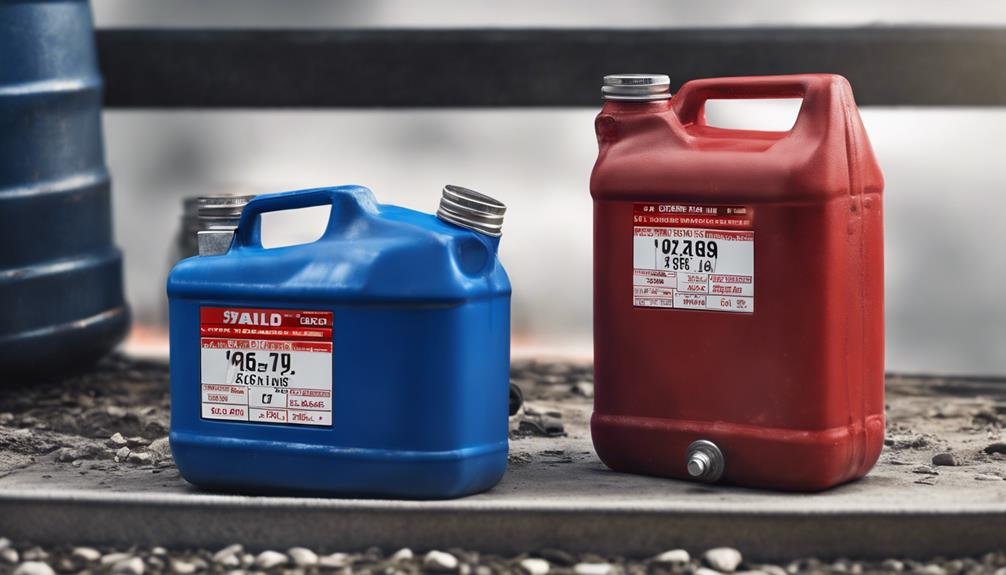When you're working with gasoline, it's important to understand its weight per gallon, which is approximately 6 pounds. This value is vital in different industries, such as automotive and aviation, where accurate weight calculations impact vehicle performance, balance, and maintenance. Factors like octane level, temperature, and additives influence gasoline weight, which affects fuel efficiency and the total vehicle weight. As you investigate the world of gasoline, you'll uncover how these factors interact and impact vehicle performance, and how understanding gasoline weight can give you a competitive edge.
Key Takeaways
- Gasoline weighs approximately 6 pounds per gallon, making it lighter than water.
- The weight of gasoline can vary slightly based on factors like octane level, temperature, and additives.
- Understanding the weight of gasoline is crucial for accurate measurements and calculations, particularly in industries like automotive and aviation.
- The weight of a full fuel tank can significantly impact a vehicle's overall weight and fuel efficiency.
- Temperature fluctuations can cause small but significant changes in gasoline weight, affecting fuel efficiency and performance.
Gasoline Weight Per Gallon Explained
When you pump gasoline into your vehicle, you're adding approximately 6 pounds of weight per gallon, an essential factor to keep in mind when calculating your vehicle's total weight and fuel efficiency.
This weight per gallon is a significant consideration, as it affects not only your vehicle's total weight but also its fuel efficiency.
You see, gasoline weighs approximately 6 pounds per gallon, making it lighter than water. This weight is relatively consistent, although it can vary slightly depending on factors like octane level and additives.
Understanding this weight is crucial in determining your vehicle's total weight, which in turn impacts its fuel efficiency. Accurate calculations are essential in estimating fuel capacity and maintenance.
In fact, gasoline weight is commonly used in the automotive and aviation industries for weight and balance calculations.
Factors Affecting Gasoline Weight
You must take into account several factors that impact the weight of gasoline, such as temperature, type of gasoline, and the presence of additives like ethanol, which can influence its density and, ultimately, its weight per gallon.
Regarding temperature, cold weather causes gasoline to lose density, resulting in a lighter weight per gallon. On the other hand, high temperatures can increase its density, leading to a heavier weight per gallon.
The type of gasoline also plays a significant role, as different blends can have varying densities. Furthermore, the presence of additives like ethanol can alter the weight of gasoline. Ethanol, for instance, can increase the density of gasoline, leading to a heavier weight per gallon.
Understanding how these factors affect gasoline weight is important for accurate measurements.
As you can see, the weight of gasoline isn't fixed and can fluctuate based on different factors. By recognizing these factors, you can better comprehend the complexities of gasoline weight and its implications.
Gasoline Vs Diesel Weight Difference

As you investigate the world of fuels, one key distinction stands out: diesel fuel weighs considerably more than gasoline, roughly 7 pounds per gallon, due to its higher density. This weight difference is important to understand, as it can greatly impact your vehicle's performance and longevity.
When you mix diesel with gasoline, you risk serious vehicle damage due to the weight difference. The higher density of diesel contributes to its heavier weight compared to gasoline, making it essential to use the correct fuel type for your vehicle. If you accidentally use the wrong fuel, corrective procedures may be necessary to prevent long-term damage.
Understanding the weight difference between diesel and gasoline is crucial to prevent vehicle damage and ensure peak performance. By recognizing the distinct properties of each fuel, you can make informed decisions regarding fueling your vehicle, avoiding costly repairs and maintaining your vehicle's overall health.
Fuel Tank Weight Calculation
Determining the weight of your fuel tank is vital, since a full tank can add a significant amount of weight to your vehicle, ranging from 73 to 165 pounds. To calculate the fuel tank weight, you need to know the weight of a gallon of gasoline, which is approximately 6.1 pounds. Multiply this by your vehicle's fuel tank capacity, and you'll get the total fuel weight.
For instance, if your car has a 15-gallon tank, the full tank would weigh around 91.5 pounds.
Keep in mind that different vehicle types have varying fuel tank capacities and weights, influencing the overall vehicle weight and performance. Carrying extra weight in the gas tank strains the engine, leading to reduced fuel efficiency and increased wear and tear.
Furthermore, insurance costs may rise with added weight in the fuel tank, affecting vehicle maintenance and ownership expenses. Understanding the fuel tank weight calculation is vital to make informed decisions about your vehicle's performance and maintenance.
Temperature Impact on Gasoline Weight

Gasoline's weight takes a hit in the cold, contracting and shedding pounds as the mercury drops.
As you might expect, temperature has a significant impact on gasoline weight. When it's cold outside, gasoline contracts, becoming denser and heavier. Conversely, when it's warm, gasoline expands, becoming less dense and lighter. This temperature impact affects the density of gasoline, which, in turn, influences its weight.
Understanding this temperature effect is essential for accurate gasoline weight measurements. You see, temperature changes can lead to variations in the weight of gasoline, which can, in turn, affect fuel efficiency. A small change in temperature can add up to a significant difference in gasoline weight over time.
As you fill up your tank, the weight of the gasoline can fluctuate based on the temperature, which may impact your vehicle's fuel efficiency. By recognizing the temperature impact on gasoline weight, you'll better comprehend the complexities of fuel efficiency and weight measurements.
Weather Conditions and Gasoline Weight
You'll notice that temperature is just one aspect of the weather that affects gasoline weight, and other weather conditions also play a significant role in determining the weight of gasoline per gallon.
Weather conditions, in fact, have a profound impact on gasoline weight. Temperature fluctuations, for instance, can cause gasoline density and weight to shift. In cold weather, gasoline contracts, leading to a lighter weight per gallon. This, in turn, can affect fuel efficiency, as engines are calibrated to optimize performance under specific conditions.
Understanding these weather-related weight variations is important for accurate calculations and best engine performance. In cold weather, the lighter gasoline weight can influence fuel efficiency, potentially affecting vehicle performance. By grasping the relationship between weather conditions and gasoline weight, you'll better comprehend the complexities of fuel efficiency and engine performance.
As you explore further into the world of gasoline weight, keep in mind that weather conditions play an essential role in determining the weight of gasoline per gallon.
Gasoline Weight in Automotive Performance

When it comes to maximizing your vehicle's performance, understanding the weight of gasoline per gallon is vital, as it directly impacts your vehicle's total weight distribution, handling, and fuel efficiency. As you explore ways to improve your vehicle's performance, keep in mind that gasoline weight plays a pivotal role in determining fuel efficiency and consumption rates.
Here's a breakdown of how gasoline weight affects your vehicle's performance:
| Aspect of Performance | Impact of Gasoline Weight | Why It Matters |
|---|---|---|
| Weight Distribution | Affects total vehicle weight, influencing handling and stability | Proper weight distribution ensures better control and safety |
| Fuel Efficiency | Influences fuel consumption rates, affecting your wallet and the environment | Optimizing fuel efficiency saves you money and reduces emissions |
| Acceleration and Braking | Impacts your vehicle's acceleration, braking, and overall responsiveness | Better performance means a more enjoyable and safe driving experience |
Practical Applications of Gasoline Weight
As you prepare to optimize your vehicle's performance, understanding the practical applications of gasoline weight becomes essential in ensuring accurate fuel capacity estimates and informed decision-making in emergency situations.
When estimating fuel capacity, knowing the weight of gasoline is key to avoid misconceptions that can lead to problems. Gasoline weighs around 6 pounds per gallon, which is lighter than water, and this knowledge is crucial for accurately calculating fuel capacity.
Furthermore, the weight of gasoline can vary slightly based on factors like octane level and temperature, making precise measurements significant.
In emergencies, knowing the weight of gasoline helps in planning and decision-making, ensuring you're prepared for any situation. For instance, understanding gasoline weight can help you determine how much fuel you can carry in your vehicle, which is critical in emergency situations.
Frequently Asked Questions
How Much Do 5 Gallons of Gas Weigh in Pounds?
You're wondering how much 5 gallons of gas weigh in pounds, right? Well, you might be surprised to learn that it's approximately 30 pounds, equivalent to lugging around three medium-sized watermelons!
How Much Does 20 Gal of Gas Weigh?
You're wondering how much 20 gallons of gas weighs. Well, it's equivalent to the weight of an average adult – around 120 pounds, a significant augmentation to your vehicle's weight that affects fuel efficiency.
How Do You Calculate the Weight of Gasoline?
You calculate the weight of gasoline by multiplying the volume in gallons by the average weight per gallon, approximately 6 pounds, considering factors like octane level and additives that may slightly impact the weight.
Why Does a Gallon of Water Weigh More Than a Gallon of Gas?
You might wonder why a gallon of water weighs more than a gallon of gas – it's because water's molecular structure is denser, making it heavier than gasoline's lighter, more volatile compounds.
Conclusion
Now that you've explored the intricacies of gasoline weight per gallon, you've gained a deeper understanding of the factors influencing it, from temperature and weather conditions to the differences between gasoline and diesel.
You've also seen how this knowledge applies to fuel tank weight calculation, automotive performance, and practical applications.
With this newfound insight, you're better equipped to tackle complex automotive concepts and make informed decisions in your daily life.
